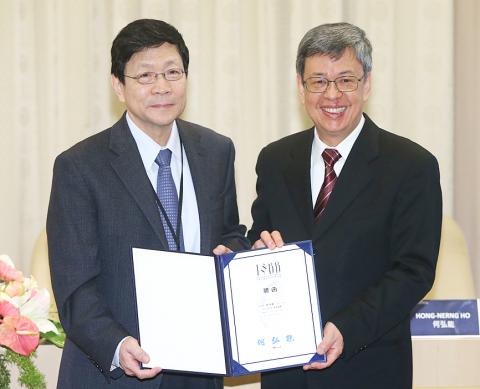Academia Sinica yesterday announced that the Taiwan Biobank, established in 2012, has collected biological information from more than 120,000 volunteers.
The biobank aims to collect genetic samples from more than 200,000 people by 2024 to aid researchers in finding the causes of chronic diseases, as well as their treatment and prevention, Academia Sinica President James Liao (廖俊智) said at the opening ceremony of a symposium on biopreservation and biobanking.
The two-day symposium, cohosted by Academia Sinica’s Institute of Biomedical Sciences, Academia, and the Taiwan Society for Biopreservation and Biobanking, focuses on the sustainability of human biobanks, precision medicine and other issues.

Photo: CNA
Participants are also to hold a round-table discussion of biomedical industry development, ethics, governance and regulations.
The Taiwan Biobank has collected biological data from people aged 30 to 70, including their height, weight, body fat, hipline, waistline, blood pressure, pulse, bone density and pulmonary function, as well as blood sample (30ml) and urine sample (15ml), for genotyping, Academia Sinica said.
Participants were also asked about their lifestyle, diet, living environment, fertility history, and personal and family medical history.
The total length of the human genome is made up of more than 3 billion DNA base pairs, and about 650,000 genetic loci in Taiwanese people can be identified through genotyping, Academia Sinica said, adding that by cross-referencing 650,000 genetic loci with other risk factors, it identified 41 highly precise prognostic biomarkers of diabetes in 2015.
The Taiwan Biobank is the largest infrastructure for Taiwan’s biomedical development, and is the only ethnic biobank in the nation with long-term traceability, Liao said.
The number of voluntary participants has exceeded 120,000, and genotyping and gene chip analysis on more than 100,000 people have been accomplished, which are provided for research and industrial analysis application, Academia Sinica said.
Also present at yesterday’s ceremony were Vice President Chen Chien-jen (陳建仁), Taiwan Biobank Project director Lee Te-chang (李德章), National Health Research Institutes distinguished researcher Tsai Shih-feng (蔡世峯), Taiwan Society for Biopreservation and Biobanking chairman Ho Hong-nerng (何弘能) and nearly 100 academics.

SECURITY: As China is ‘reshaping’ Hong Kong’s population, Taiwan must raise the eligibility threshold for applications from Hong Kongers, Chiu Chui-cheng said When Hong Kong and Macau citizens apply for residency in Taiwan, it would be under a new category that includes a “national security observation period,” Mainland Affairs Council (MAC) Minister Chiu Chui-cheng (邱垂正) said yesterday. President William Lai (賴清德) on March 13 announced 17 strategies to counter China’s aggression toward Taiwan, including incorporating national security considerations into the review process for residency applications from Hong Kong and Macau citizens. The situation in Hong Kong is constantly changing, Chiu said to media yesterday on the sidelines of the Taipei Technology Run hosted by the Taipei Neihu Technology Park Development Association. With

CARROT AND STICK: While unrelenting in its military threats, China attracted nearly 40,000 Taiwanese to over 400 business events last year Nearly 40,000 Taiwanese last year joined industry events in China, such as conferences and trade fairs, supported by the Chinese government, a study showed yesterday, as Beijing ramps up a charm offensive toward Taipei alongside military pressure. China has long taken a carrot-and-stick approach to Taiwan, threatening it with the prospect of military action while reaching out to those it believes are amenable to Beijing’s point of view. Taiwanese security officials are wary of what they see as Beijing’s influence campaigns to sway public opinion after Taipei and Beijing gradually resumed travel links halted by the COVID-19 pandemic, but the scale of

A US Marine Corps regiment equipped with Naval Strike Missiles (NSM) is set to participate in the upcoming Balikatan 25 exercise in the Luzon Strait, marking the system’s first-ever deployment in the Philippines. US and Philippine officials have separately confirmed that the Navy Marine Expeditionary Ship Interdiction System (NMESIS) — the mobile launch platform for the Naval Strike Missile — would take part in the joint exercise. The missiles are being deployed to “a strategic first island chain chokepoint” in the waters between Taiwan proper and the Philippines, US-based Naval News reported. “The Luzon Strait and Bashi Channel represent a critical access

Pope Francis is be laid to rest on Saturday after lying in state for three days in St Peter’s Basilica, where the faithful are expected to flock to pay their respects to history’s first Latin American pontiff. The cardinals met yesterday in the Vatican’s synod hall to chart the next steps before a conclave begins to choose Francis’ successor, as condolences poured in from around the world. According to current norms, the conclave must begin between May 5 and 10. The cardinals set the funeral for Saturday at 10am in St Peter’s Square, to be celebrated by the dean of the College